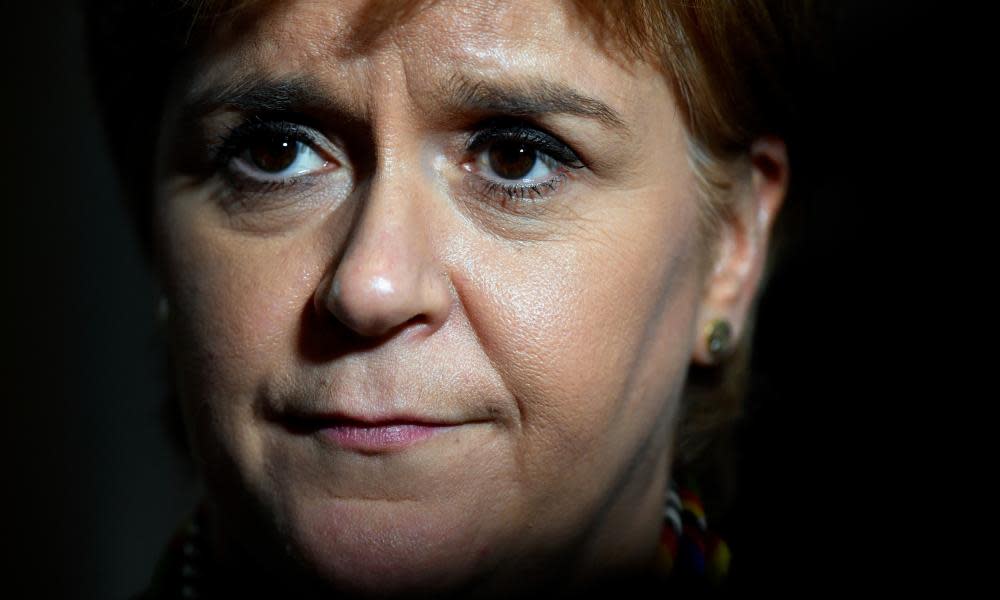Scottish independence: Sturgeon to press on with referendum

Nicola Sturgeon has pledged to press on with a fresh independence referendum after dismissing Theresa May’s promise of substantial new powers for Scotland after Brexit.
The first minister said May’s decision to trigger article 50 on Wednesday, beginning the UK’s divorce from the EU, was one of the most destructive acts by a British leader in modern history, threatening hundreds of thousands of jobs across the UK.
Writing for the Guardian, Sturgeon said the decision was dispiriting, economically foolhardy and constitutionally reckless, threatening stability in Northern Ireland. It also undermined European efforts to combat climate change and collective security, she said.
“Brexit – especially the hard Brexit shaped by May’s inability to shake off the agenda of the Ukip-tinged right wing of her own party – threatens to be an act of self-harm on a scale barely understood,” she said.
She accused May of paying only superficial attention to the Scottish government’s demands for a special deal on the single market, opening up further conflicts with the UK government over the benefits Scotland could gain from Brexit.
“The result is that we must now ensure that people in Scotland are given a choice between the hard Brexit deal now being negotiated, and independence,” she said.
Just as the prime minister told MPs at Westminster she had formally triggered article 50, Sturgeon had received a letter from David Davis, the UK Brexit secretary, insisting his government was engaging seriously with Sturgeon’s proposals.
Neither government would release Davis’s letter but it is understood that he told Sturgeon he was disappointed that she had launched her claim for an independence referendum before she saw the full extent of the new powers on offer once EU laws and regulations were repatriated.
He is expected to set out some of the areas where Holyrood will win new powers in his statement to the Commons on the great repeal bill on Thursday, which will begin the complex task of repatriating at least 19,000 EU regulations and directives into UK law.
Sturgeon dismissed his letter with a single sentence in her official statement on article 50, saying only that it included “a dismissal of our compromise proposals to keep Scotland in the single market at the same time as the article 50 letter was sent ”.
Speaking on BBC Radio Scotland after May’s announcement, David Mundell, the Scot land secretary, said Sturgeon was painting a false picture about the scope and extent of the new powers on offer.
May pledged there would a “significant increase in decision-making power” for all the devolved administrations in her letter to Donald Tusk, the president of the Council of Europe, and in her statement to MPs.
Mundell insisted it was too early to offer specific examples of which new powers would pass directly to Holyrood. Those needed to be examined systematically but he said they related to the criminal justice system, environmental policy, farming and fishing.
“There are some responsibilities we will need to conduct on a UK-wide level and we need to look at which those are. There are some where we believe a shared responsibility is the best way forward. I’m looking forward to entering into constructive discussions with the Scottish government in that regard,” he said.
Mundell and other opposition parties leaders said their case for resisting a referendum until after Brexit was strengthened by new polling data from the social research agency ScotCen which found a large majority of Scottish voters were very wary of a separate Scottish deal with the EU.
While a large majority preferred to remain part of the EU single market and would agree to more migration to get a trade deal, it found that a majority of both leave and remain voters wanted Scotland to have the same immigration rules and the same trade rules as England and Wales.
It found 64% of Scots wanted EU migrants to have the same immigration rights as non-EU migrants; 65% wanted customs checks and 59% wanted a ban on migrants getting welfare. Those figures were close to UK levels.
Prof John Curtice, the elections expert who oversaw the study, said those figures raised challenging questions for Sturgeon as she sought to increase backing for independence by using Brexit as leverage.
“Against this backdrop it seems that, at present at least, any second attempt to try to persuade voters to vote for independence because of the allegedly unsatisfactory shape of the Brexit deal that the UK is attempting to secure with the EU is unlikely to prove particularly persuasive,” he said.

 Yahoo News
Yahoo News 
